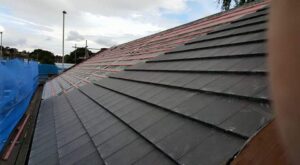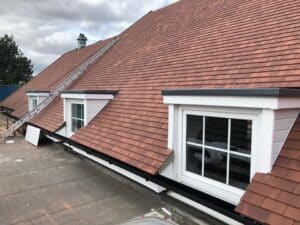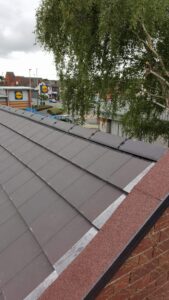
What Are the Roof Tile Options?
Roofs are arguably the most important structural element of your home, keeping your property shielded from the elements.
Looking for renovation ideas for listed buildings? We are here to help.
When you own a listed building, you own a piece of architectural history, so retaining its heritage and structural integrity is essential. Grade I, grade II and grade III buildings are protected by law and special permissions are required to make changes. However, with sympathetic building in mind, you can reap the rewards of listed building renovation and enjoy a truly unique home.
With the right approach to a sympathetic renovation, you can incorporate the practical features you require in a home, without losing any of its unique charm.
In this article, we will discuss 6 sympathetic design ideas for listed buildings, which we hope will give you some insight and inspiration for your renovation journey.
The features of a listed building are often what draw people to it in the first place, so it makes perfect sense to showcase the unique architectural detail it has to offer. Gothic, Baroque or Art Deco-style buildings all have unique selling points, including sash windows, high ceilings, period doors, roofs and chimneys, stucco, ironwork, stone carvings and plasterwork. Highlighting these features in your design decisions will help retain your home’s character.
When selecting materials for your listed building, whether it be timber, slate or metal, it is worth doing your homework. Some products can accelerate the deterioration of the original material, so for this reason, it’s often wise to seek the advice of an expert. Those with a history of listed building renovations will be able to find the right products to complement your building on both a practical and aesthetic level.
Living in a listed building doesn’t mean you should forgo modernity altogether. Integrate modern features and mod-cons in functional spaces like kitchens and bathrooms without losing the original appeal. Chrome, glass and contemporary colour schemes often look fantastic against a classic backdrop – allowing you to enjoy the best of both worlds.
Listed buildings are often quite drafty and their protected status typically blocks the installation of double-glazed windows, making it difficult to retain heat. However, it is possible to work around restrictions and make your listed home more energy efficient. Consult experts on the right insulation and materials to keep you comfortable in cooler weather, without trapping damp-causing moisture.
Your roof is the most structurally important part of your property and keeps you protected from the elements. It is essential to inspect your roof regularly, though older buildings are particularly vulnerable to wear and tear. Roofing experts will often be able to source natural slate replacement tiles for your roof and also work to protect original features such as chimney stacks.
Your local archive centre is a treasure trove for information and could give you new inspiration for your listed property – this is a great way to immerse yourself in period detail and learn how to maximise your home’s potential.
The prospect of renovating a listed building can be exciting, though before your ideas come to fruition, it’s essential to get the green light from your local authority. Anything that could compromise the internal or external façade of a listed building cannot be undertaken without express permission.
However, with the right research and knowledge of your limitations – you could end up with the home of your dreams, proud of the knowledge you are protecting a piece of local heritage for future generations.
We hope our article has given you practical building ideas for listed buildings and allowed you to recognise all the possibilities available.
Want to find out more? LMC Roofing and Building is a long-established building contractor with plenty of experience in listed buildings and historical facades. Speak to a member of our friendly team to find out more.

Roofs are arguably the most important structural element of your home, keeping your property shielded from the elements.

A tried and tested method of waterproofing flat and low-pitched roofs, Built-up felt roofing (BUR) is a roofing system that has been in use for many years.

Known for its versatility, rubber paint makes a great option for various surfaces from plastic pipes to brick walls…

When you own a listed building, you own a piece of architectural history, so retaining its heritage and structural integrity is essential.

If you’re worried about the condition of your roof and whether it needs to be repaired or replaced, you should consider having a roof survey conducted…

You can spot roof flashing on any roof that has been properly installed. Sometimes known as leadwork, flashing can be found anywhere that something protrudes through the roof or where the plane of a roof meets a barrier.



LMC Roofing & Building Ltd are professional roofers who offer comprehensive roofing, building and landscaping services to domestic, commercial and industrial customers.
| Cookie | Duration | Description |
|---|---|---|
| cookielawinfo-checkbox-analytics | 11 months | This cookie is set by GDPR Cookie Consent plugin. The cookie is used to store the user consent for the cookies in the category "Analytics". |
| cookielawinfo-checkbox-functional | 11 months | The cookie is set by GDPR cookie consent to record the user consent for the cookies in the category "Functional". |
| cookielawinfo-checkbox-necessary | 11 months | This cookie is set by GDPR Cookie Consent plugin. The cookies is used to store the user consent for the cookies in the category "Necessary". |
| cookielawinfo-checkbox-others | 11 months | This cookie is set by GDPR Cookie Consent plugin. The cookie is used to store the user consent for the cookies in the category "Other. |
| cookielawinfo-checkbox-performance | 11 months | This cookie is set by GDPR Cookie Consent plugin. The cookie is used to store the user consent for the cookies in the category "Performance". |
| viewed_cookie_policy | 11 months | The cookie is set by the GDPR Cookie Consent plugin and is used to store whether or not user has consented to the use of cookies. It does not store any personal data. |